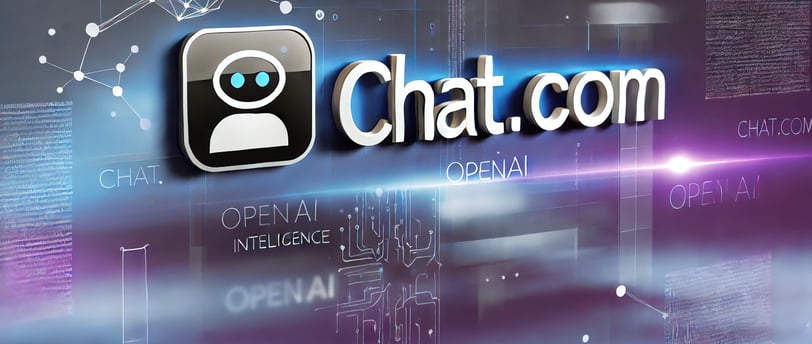Discover My Latest Book "BLACK FRIDAY MASTER" – Now Available! Order your copy here.
OpenAI Acquires Chat.com – What Does This Mean for the Future of Artificial Intelligence and Everyday Communication?
Marko Ormay
11/7/20244 min read


The news that OpenAI, the company behind ChatGPT, has acquired the domain Chat.com has drawn significant attention in the tech world. Previously purchased for $15.5 million, this domain is among the most valuable internet addresses globally. Although at first glance this may seem like an expensive acquisition for just a name, there's much more behind this move than merely redirecting traffic. Let’s explore what this step means for OpenAI, the AI industry, and ultimately, for all of us as users.
Why is the Chat.com domain so valuable?
Chat.com is one of the most recognizable and sought-after domains on the internet, as the word "chat" is synonymous with direct, fast, and interactive communication. Given the growing trend of AI tools like ChatGPT, owning this domain provides OpenAI with added visibility, credibility, and accessibility.
In the digital world, a domain like Chat.com becomes a virtual address that makes it easier for users to access services without further explanation. Just as users go directly to Google for searches, Chat.com could become synonymous with AI in communication—a place to go when you want to "talk" with AI. This is one of the key reasons why this domain holds such value.
Let’s recall a few past acquisitions in the digital world. For example, Facebook's purchase of WhatsApp for $19 billion in 2014 raised many doubts at the time, as it seemed like a vast expenditure for a messaging app. However, WhatsApp quickly became a global communication tool with billions of users, now a key part of Facebook's strategy. Additionally, Voice.com was sold for a record $30 million to Block.one, setting a new standard for premium domain value. This acquisition demonstrated how the strategic purchase of a domain could be essential for a company's growth and return on investment.
Just as these past examples changed the game, Chat.com has the potential to redefine how users approach AI communication tools.
Why did negative comments emerge?
After the news of the purchase became public, negative comments also surfaced, which is common with large acquisitions. Critics argue that the price is too high and that OpenAI could have invested the funds in further technology development rather than in a domain purchase. However, the value of the domain should not be viewed solely through the price but rather through broader business strategy and long-term benefits.
The acquisition of Chat.com is not just about owning a domain—it’s an investment in user recognition and trust, which are key factors in an industry where AI competition grows daily. Owning a domain like Chat.com helps OpenAI stand out in the global market, where users increasingly seek reliable and easily accessible AI tools.
Building Trust as a Key Reason for Acquiring the Domain
I believe that trust is one of the main factors that will enable broader adoption of artificial intelligence, and an acquisition like Chat.com could be essential for strengthening it. When users see a company like OpenAI behind such a recognizable and accessible domain, they feel secure and more trusting of the technology they are using. In my opinion, trust is not just about data security—it also stems from the perception of simplicity and intuitiveness in accessing AI. A domain like Chat.com has the potential to significantly reduce barriers and bring AI technology closer to everyday users. I believe this approach will contribute to easier adoption of AI technologies among general users in the future.
For many people, artificial intelligence can seem abstract, even intimidating. However, when it is connected to a domain that evokes communication and ease of access, I believe it creates a sense of familiarity—like "speaking to a known face" in the digital world. In my opinion, Chat.com can become a place where users feel that AI technology is closer and easier to use—a place where they feel at home as they use AI for various everyday needs, whether seeking answers, learning, working, or simply having fun.
In my view, this acquisition sends an important message that artificial intelligence can be an intuitive and user-friendly technology. When users trust a platform, they are more open to exploring all the benefits AI can bring to their lives, and I see this trust as the foundation for deeper integration of AI technologies into our society and everyday activities.
I consider OpenAI’s purchase of Chat.com a far-reaching move that could change how we experience and use artificial intelligence in daily life. I believe the primary goal of this acquisition is to enhance user trust in AI by making it more accessible and user-friendly. I'm also confident that this approach will inspire many other tech companies.
However, this raises a question—is this approach truly enough to make AI a reliable tool for all users? Can a simple, recognizable domain overcome the fears and doubts that many people have about artificial intelligence? And finally, if this trend of strategic acquisitions continues, how will it impact the entire digital ecosystem and our relationship with technology?
I am convinced that this is only the first step, and in the coming years, we will see how these moves resonate globally, not only in the tech industry but also in a broader societal context.


Policies
Copyright © 2024 MarkoOrmay.com All rights reserved.
CONECT WITH ME
